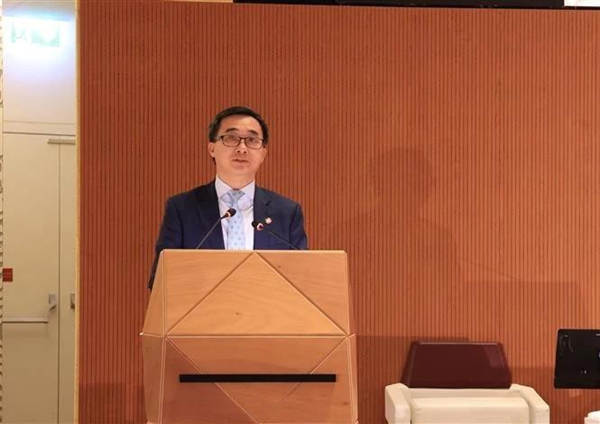 Society
Society


|
| Deputy Minister of Health Trần Văn Thuấn speaks at a high-level session of the 78th World Health Assembly (WHA) on May 20. VNA/VNS Photo |
GENEVA — Deputy Minister of Health Trần Văn Thuấn affirmed Việt Nam’s strong and effective ties with the World Health Organisation (WHO) at a high-level session of the 78th World Health Assembly (WHA) on May 20.
Speaking at the event, Thuấn mentioned Việt Nam’s preparations for the celebration of 50 years of close and effective cooperation with the WHO.
He stressed Việt Nam has achieved notable health milestones with WHO’s continuous support, elaborating that the country banned e-cigarettes and heated tobacco products last year, a move aimed at protecting young people and reducing long-term healthcare costs.
The official added that social health insurance in Việt Nam now covers nearly 95 per cent of the population, including low-income households and those in the informal sector. Healthcare is now more accessible and equitable than ever.
Moreover, as one of the countries most vulnerable to natural disasters, Việt Nam is working to improve the climate resilience of its health facilities.
Thuấn noted that this year’s WHA theme "One World for Health" underlines the importance of continued cooperation and solidarity in these challenging times. He expressed appreciation for WHO’s support in improving health and life of people in Việt Nam.
Việt Nam hopes to maintain this trusted cooperation and continue working hand in hand with other member states and partners, he said.
Within the framework of the WHA in Geneva, WHO Director-General Tedros Adhanom Ghebreyesus presented Việt Nam with a certificate recognising the elimination of trachoma. The recognition follows decades of coordinated action across the health sector to improve community health and prevent blindness caused by this preventable disease.
Ghebreyesus praised Việt Nam’s achievement, calling it a testament to the commitment of the government, health workers, and communities across the country. He stressed that this is a typical example of how targeted interventions, close partnerships, and persistent efforts can make a real difference to people’s health. — VNS




